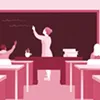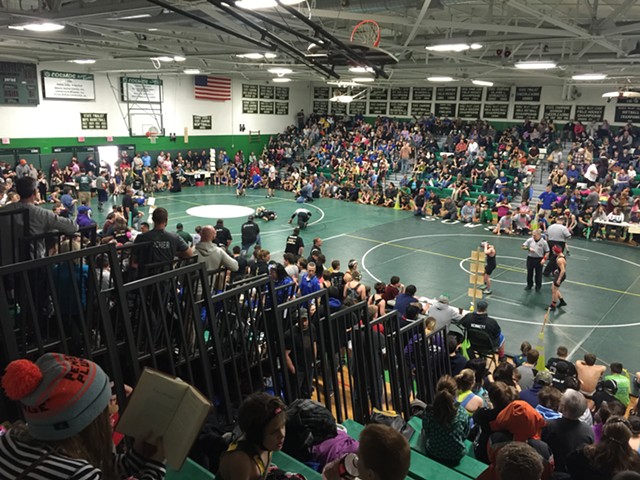
[ad_1]
The Vermont Agency of Education and Department of Health released new guidance on Tuesday that’s aimed at stemming the spread of COVID-19 in school-based indoor winter sports, including hockey, basketball, indoor track and bowling.
The memo — which is advisory and not mandatory — encourages schools to require masks for all student athletes, coaches, referees and spectators during indoor practice, competition and games, regardless of vaccination status.
But there are several exceptions to the recommendation. Athletes in running events where they can physically distance from others do not need to wear masks. And masks aren’t required for sports that require “inversion” — turning upside down — such as wrestling, gymnastics, cheer and dance, because of the safety hazard the masks could pose in such instances.
The state agencies also strongly recommend — but won’t require — that eligible student athletes get vaccinated. For one, it will allow them to avoid missing games or quarantining if they are exposed to COVID-19. Unvaccinated students, meanwhile, can’t compete in games or meets if they are a close contact. They can practice if they are tested each day as part of a “Test to Stay” program.
School Administrators Say They Can’t Manage State’s New COVID-19 Testing Proposal

School Administrators Say They Can’t Manage State’s New COVID-19 Testing Proposal
By Alison Novak
Education
Unvaccinated students playing sports where masks can’t be consistently worn should participate in weekly COVID-19 testing, the guidance says. Outdoor winter sports can be held as normal, with any COVID-19 mitigation measures left up to individuals.
The state is also sharing its recommendations with recreational youth sports organizations that offer indoor winter leagues and programs, Natural Resources Secretary Julie Moore said at Gov. Phil Scott’s press conference on Tuesday.
Last school year, 23 of the 89 COVID-19 outbreaks in Vermont’s K-12 schools were linked to school sports, according to a June 2021 report from the Vermont Department of Health. Eleven of those outbreaks were related to hockey, and nine involved basketball. Six of the outbreaks involved transmission between teams. High school sports-related outbreaks began in January 2021. By February, 30 to 40 percent of high school COVID-19 cases were linked to sports. Students athletes were required to wear masks last winter season, except gymnasts performing inversions and those in snow sports.
This year, of course, athletes 12 and older are now eligible for vaccines. Moore called the new guidance “a balanced approach” that will “take full advantage of the emotional and health benefits that sports provide to many young people, while at the same time being protective of current conditions on the ground.”
“To be honest, we had hoped for something stronger, like requirements as opposed to recommendations,” Nichols wrote in an email to Seven Days. “From our perspective, the worry is that school districts might have rules all over the place, especially in terms of spectator attendance at games. We strongly believe that if everyone is following the same rules it is much better for students, parents, coaches, officials and school administrators.”
On Twitter, South Burlington High School principal Patrick Burke expressed a similar sentiment.
“Good news: All winter sports are on! Meh News: No common expectations about how to run events,” Burke wrote. “Question: If no capacity limits could VT gyms/rinks be the only full venues in VT filled where no vax attestation is required?”
At Tuesday’s press conference, Education Secretary Dan French also announced that the state would extend its universal masking recommendation for schools. Under previous guidance, those in schools where more than 80 percent of students were vaccinated would be allowed to shed their masks on November 1. But French extended the date to January 18, the day after the Martin Luther King Jr. Day holiday weekend.
The new date will allow for schools to get through the holiday period, which often brings more social gathering and traveling, French said. It will also give the state time to make progress on vaccinating the remainder of school-age children. The U.S. Centers for Disease Control and Prevention is expected to green-light vaccinations for 5- to 11-year-olds as early as next week.
“This vaccination effort not only will keep our kids safe,” French said, “but also will be, I think, a game changer in terms of … managing the cases at the younger grades.”
[ad_2]
Source link
